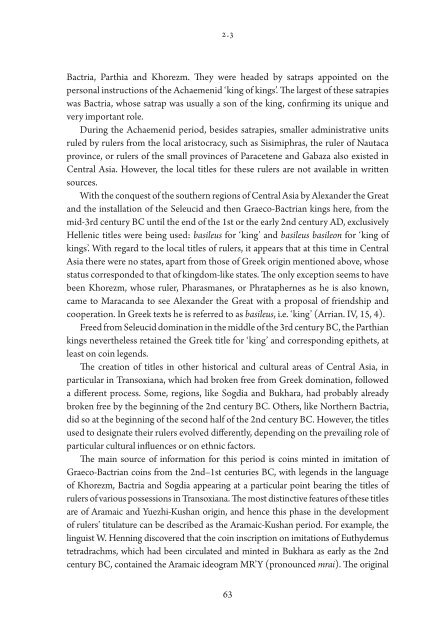You also want an ePaper? Increase the reach of your titles
YUMPU automatically turns print PDFs into web optimized ePapers that Google loves.
2 .3<br />
Bactria, Parthia and Khorezm. They were headed by satraps appointed on the<br />
personal instructions <strong>of</strong> the Achaemenid ‘king <strong>of</strong> kings’. The largest <strong>of</strong> these satrapies<br />
was Bactria, whose satrap was usually a son <strong>of</strong> the king, confirming its unique and<br />
very important role.<br />
During the Achaemenid period, besides satrapies, smaller administrative units<br />
ruled by rulers from the local aristocracy, such as Sisimiphras, the ruler <strong>of</strong> Nautaca<br />
province, or rulers <strong>of</strong> the small provinces <strong>of</strong> Paracetene and Gabaza also existed in<br />
Central <strong>Asia</strong>. However, the local titles for these rulers are not available in written<br />
sources.<br />
With the conquest <strong>of</strong> the southern regions <strong>of</strong> Central <strong>Asia</strong> by Alexander the Great<br />
and the installation <strong>of</strong> the Seleucid and then Graeco-Bactrian kings here, from the<br />
mid-3rd century BC until the end <strong>of</strong> the 1st or the early 2nd century AD, exclusively<br />
Hellenic titles were being used: basileus for ‘king’ and basileus basileon for ‘king <strong>of</strong><br />
kings’. With regard to the local titles <strong>of</strong> rulers, it appears that at this time in Central<br />
<strong>Asia</strong> there were no states, apart from those <strong>of</strong> Greek origin mentioned above, whose<br />
status corresponded to that <strong>of</strong> kingdom-like states. The only exception seems to have<br />
been Khorezm, whose ruler, Pharasmanes, or Phrataphernes as he is also known,<br />
came to Maracanda to see Alexander the Great with a proposal <strong>of</strong> friendship and<br />
cooperation. In Greek texts he is referred to as basileus, i.e. ‘king’ (Arrian. IV, 15, 4).<br />
Freed from Seleucid domination in the middle <strong>of</strong> the 3rd century BC, the Parthian<br />
kings nevertheless retained the Greek title for ‘king’ and corresponding epithets, at<br />
least on coin legends.<br />
The creation <strong>of</strong> titles in other historical and cultural areas <strong>of</strong> Central <strong>Asia</strong>, in<br />
particular in Transoxiana, which had broken free from Greek domination, followed<br />
a different process. Some, regions, like Sogdia and Bukhara, had probably already<br />
broken free by the beginning <strong>of</strong> the 2nd century BC. Others, like Northern Bactria,<br />
did so at the beginning <strong>of</strong> the second half <strong>of</strong> the 2nd century BC. However, the titles<br />
used to designate their rulers evolved differently, depending on the prevailing role <strong>of</strong><br />
particular cultural influences or on ethnic factors.<br />
The main source <strong>of</strong> information for this period is coins minted in imitation <strong>of</strong><br />
Graeco-Bactrian coins from the 2nd–1st centuries BC, with legends in the language<br />
<strong>of</strong> Khorezm, Bactria and Sogdia appearing at a particular point bearing the titles <strong>of</strong><br />
rulers <strong>of</strong> various possessions in Transoxiana. The most distinctive features <strong>of</strong> these titles<br />
are <strong>of</strong> Aramaic and Yuezhi-Kushan origin, and hence this phase in the development<br />
<strong>of</strong> rulers’ titulature can be described as the Aramaic-Kushan period. For example, the<br />
linguist W. Henning discovered that the coin inscription on imitations <strong>of</strong> Euthydemus<br />
tetradrachms, which had been circulated and minted in Bukhara as early as the 2nd<br />
century BC, contained the Aramaic ideogram MR’Y (pronounced mrai). The original<br />
63


